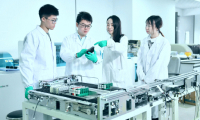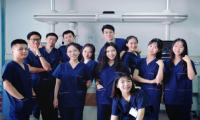2025 Enrollment is open for the International PhD Programs in Basic Medicine and Biomedical Engineering, Shenzhen University Medical School
Applications are now being accepted for the Shenzhen University (SZU) Medical School international PhD programs in basic medicine and biomedical engineering.
Program Overview:
Basic Medicine
Guided by national needs and based on the coordinated development of the Shenzhen Hong Kong Science and Technology Special Zone, we aim to cultivate high-level composite talents in "basic medicine+X" who are innovative and interdisciplinary.
Training objective: To benchmark the major strategic needs of "human health" and grasp the cutting-edge dynamics and development trends in the field of basic medical research; Integrating the characteristics of Shenzhen and Hong Kong, emphasizing interdisciplinary and practical applications, cultivating "basic medicine+X" composite medical professionals with solid basic medical theoretical knowledge and experimental skills, innovative spirit, good scientific and humanistic literacy, independent ability to engage in basic medical education, research and transformation, and international perspective. More information on the potential mentors is available at: https://med.szu.edu.cn/en/faculty/sciences.
Biomedical Engineering (Medicine/Engineering/Sciences)
The program aims at training students with solid theoretical and systematic professional knowledge in advanced biomedical electronics, artificial intelligence in biomedicine, intelligent sensors, molecular medicine and related biomedical engineering fields. Graduates of this program will have the abilities to undertake independent scientific research, understand the current status and future trends of medicine/biomedical engineering, and write and communicate in English.
MAIN RESEARCH FIELDS:
1. Biomedical instrumentations and informatics: Study, research on and apply advanced biomedical instrumentation, informatics and artificial intelligence techniques to collect, analyze and evaluate health-related biomedical information. Establish mechanical, electrical, analytical, statistical and machine learning techniques, hardware and/or software, for the driving clinical/biomedical needs.
2. Cell and tissue engineering: research on various types of stem cells and bioscaffold materials technology, research on tissue engineering and regeneration technology for acute and chronic injury and disease; research on cell engineering and nanomaterial labeling technology based on modern gene technology, To achieve the in vivo and in vitro cell tracing and monitoring; to develop new sources of stem cells, to carry out research on stem cell scale and industrialization amplification technologies, including the development of 3D culture and amplification systems and bioreactor systems.
3. Systematic Biomedical: Using techniques and methods of biophysics and biochemistry, bioinformatics and systems biology for human aging and major diseases such as tumors, cardiovascular and cerebrovascular diseases, metabolic diseases, infectious diseases, etc. , cells, tissues, organs to the overall system to carry out original research at multiple levels, explore human disease mechanisms, develop translational medicine, and provide personalized and precise diagnosis and treatment programs.
4. Biosensor and Bioanalysis: Targeting the key issues of cancer diagnosis and cancer therapy evaluation by developing novel strategies in biomolecular detection and synthesizing functional nanomaterials for can cell imaging and therapy: 1) Developing highly selective, sensitive, or multiplex electrochemical and optical methods for in-vitro biomolecular analysis. 2) Fabricating multi-functional nanoprobes for cell recognition, imaging, and intracellular biomolecular regulation. 3) Designing multifunctional nanomaterials-based theranostic platforms for cancer diagnosis and cancer therapy.
Shenzhen is an international city of innovation in China: It is located across the bay from Hong Kong and offers a subtropical monsoon climate with clean air all year round. SZU (https://en.szu.edu.cn/) is the only comprehensive university fully supported by the Shenzhen municipal government. The School of Medicine hosts an internationally competitive faculty focusing on DNA damage repair, cancer, infectious disease, cardiovascular disease, and drug discovery.
Successfully enrolled PhD students will receive a generous stipend not less than 70,000 RMB per year in total to cover all research costs, tuition fees, and work-related travel. In addition, they are eligible to apply for merit-based scholarships, including Guangdong Government Outstanding International Student Scholarship (30,000 RMB/person), Shenzhen Universiade Scholarship (48,000 RMB/person), Shenzhen University Innovative Talents Scholarship (up to 77,000 RMB/person), and Shenzhen University Excellent PhD Scholarship (20,000 RMB/person).
Eligibility
A maximum of 40 successful PhD candidates will be enrolled on the programs in September 2025, with the expectation that they will graduate within 4-5 years. To be eligible to apply to the programs, applicants must:
Hold a citizenship other than the People’s Republic of China, demonstrated by a valid foreign passport.
Be fluent in written and spoken English, evidenced by a TOEFL (at least 95) or IELTS (at least 6.5) score report if not a native of an English-speaking country.
Hold a Bachelor's or Master’s degree in a basic medicine or biomedical engineering discipline with a GPA in the top 30% of class from a top 300 QS ranking university, or with a GPA in the top 10% of class from a 301-600 QS ranking university. The QS World University Rankings can be found here: https://www.topuniversities.com/world-university-rankings.
Any SCI publication is a plus.
Application Procedure
To apply for a position on the programs, potential candidates must provide:
A completed, signed and scanned application form that is available from https://med.szu.edu.cn/en/students/programms/content_9792 or by email request from lishuangshuang@szu.edu.cn (for biomedical engineering program) and molmed.hsc@szu.edu.cn (for basic medicine program).
A detailed CV demonstrating competence and motivation for science.
A personal statement of approximately 2,000 words, which details an area of study of interest (in the form of a brief research plan) and supervisor, and outlines study or professional work experience, academic and/or research achievements, and future career goals.
Two letters of recommendation from professors or associate professors (or persons of equivalent positions), emailed by the referees directly to lishuangshuang@szu.edu.cn (for biomedical engineering program) and molmed.hsc@szu.edu.cn (for basic medicine program).
A copy of all degree transcripts and certificates. Note that all documents must be translated into English and certified. Hard copies will be requested ONLY after acceptance of a place on the programs.
A synopsis of the diploma thesis.
A copy of the official TOEFL or IELTS score report.
A copy of a valid passport.
A high resolution, electronic ID photo that resembles the passport photo.
All application materials must be in English language and emailed to, lishuangshuang@szu.edu.cn (for biomedical engineering program) and molmed.hsc@szu.edu.cn (basic medicine program) by March 28th, 2025. Any applications lacking any of the above will not be considered. Please note that application materials will not be returned.
Short-listed candidates will be notified and offered a time and date for a virtual interview with the recruitment panel by the early of April.








用户登录
还没有账号?
立即注册